Degenkolb ready to follow the moves at Tour of Flanders
German looks to add to Milan-San Remo victory on the cobbles
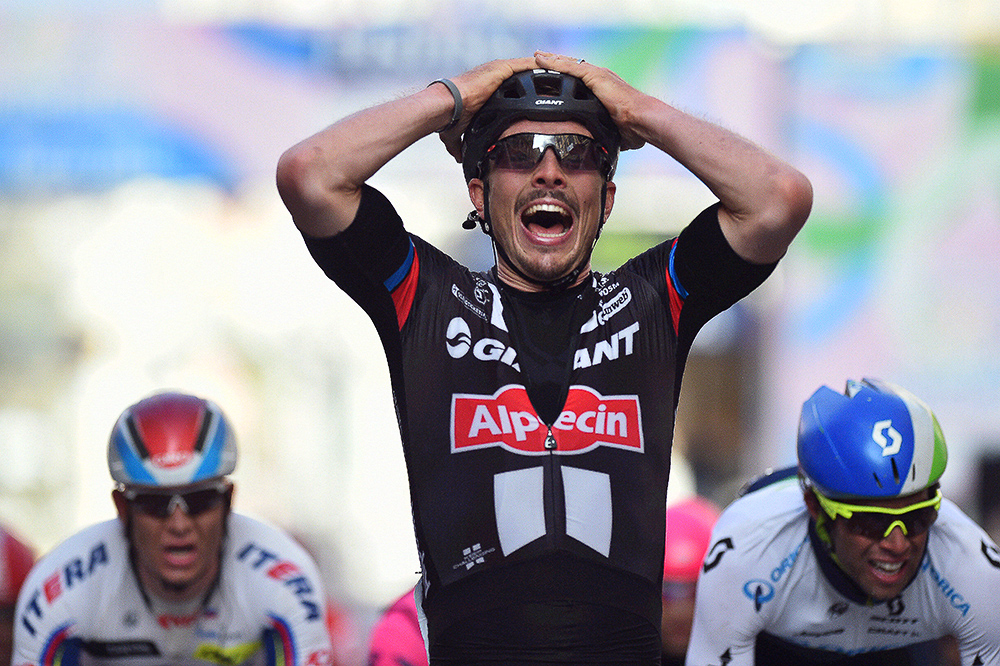
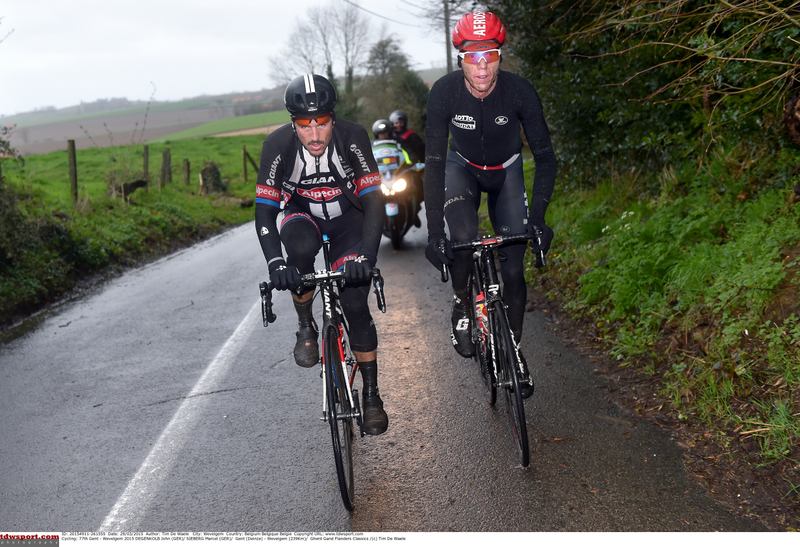
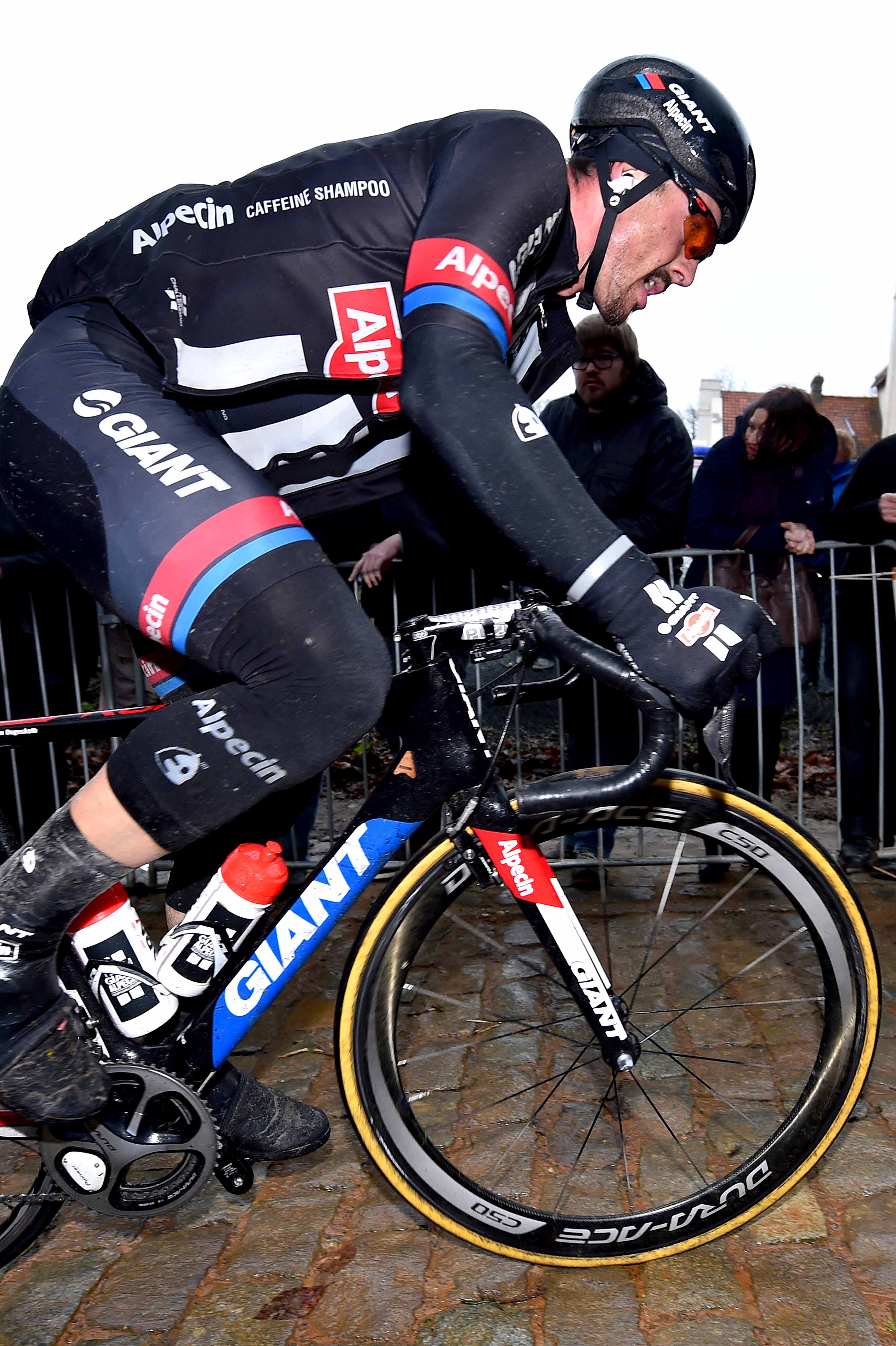
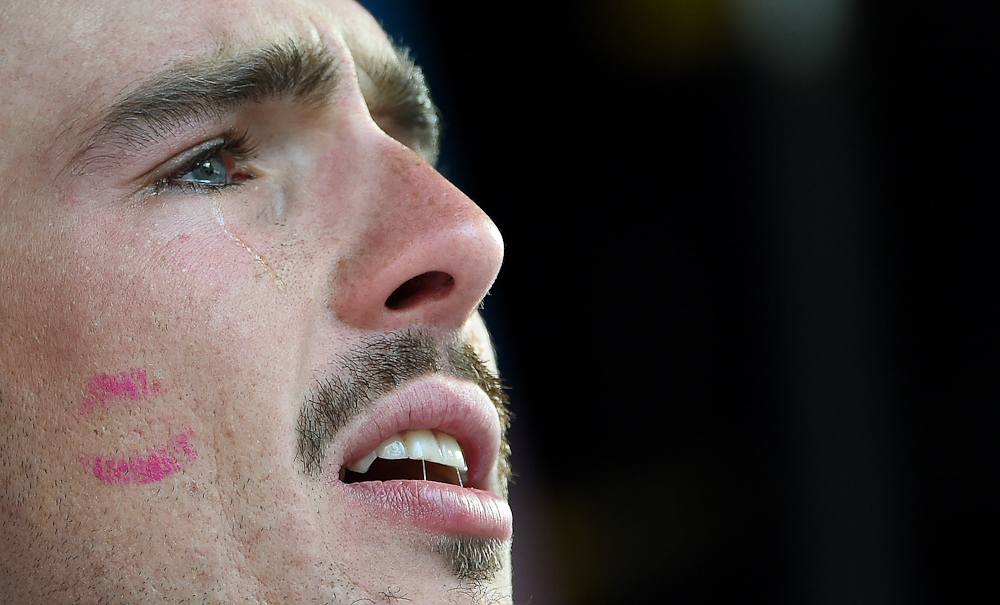
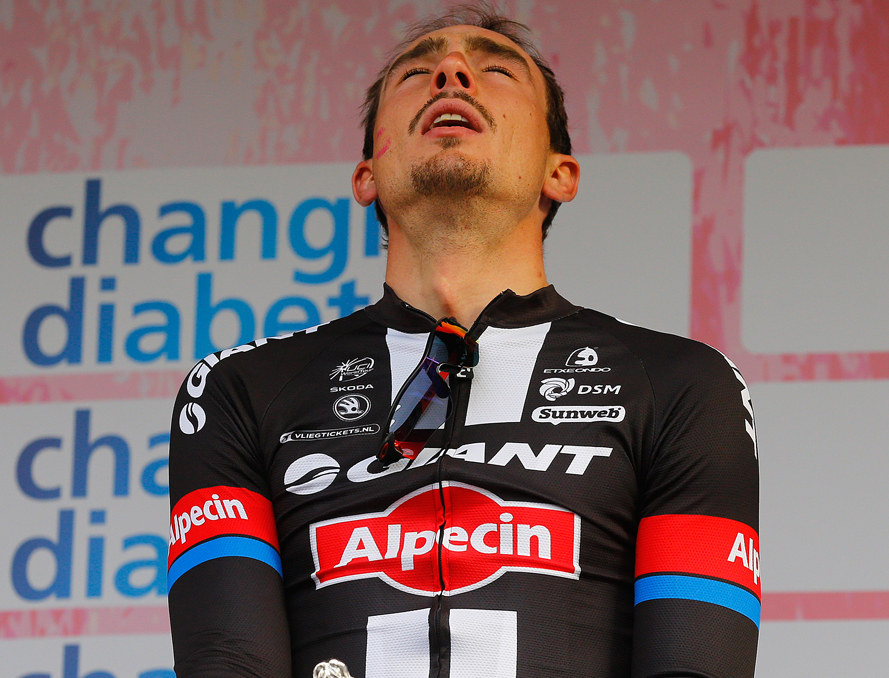
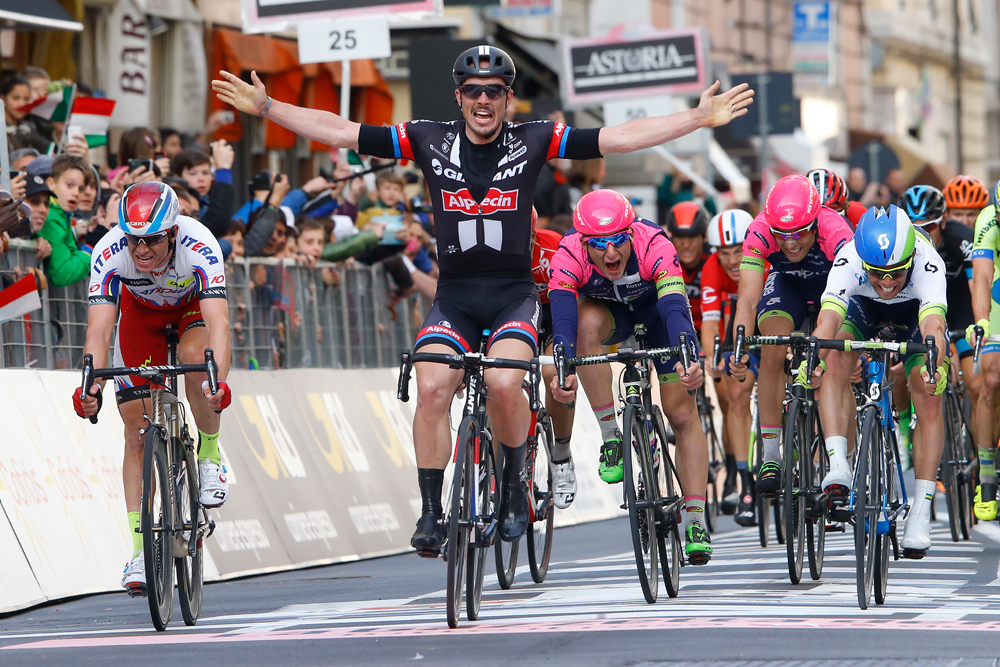
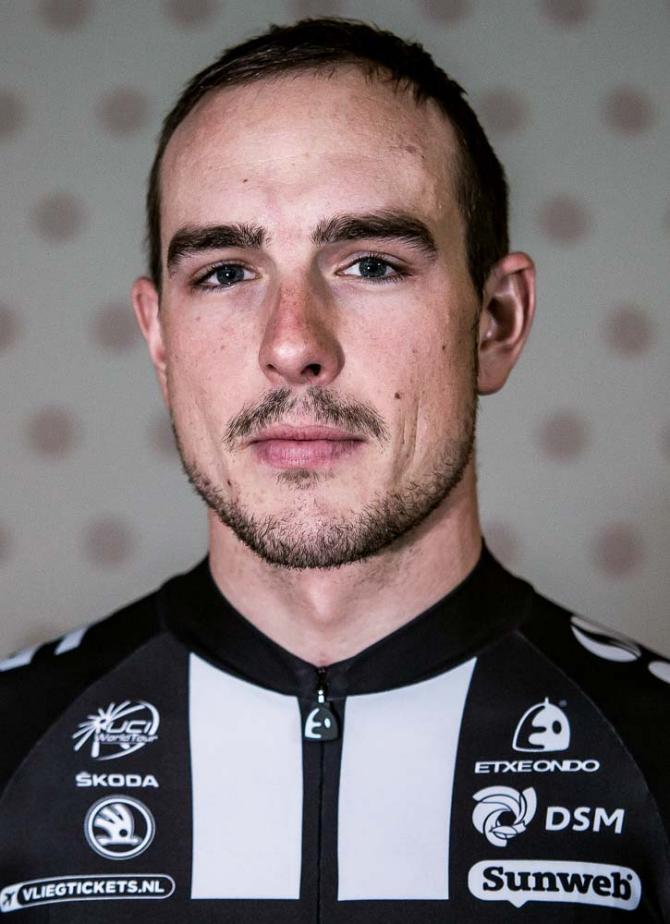
Amid the elation of his Milan-San Remo victory, John Degenkolb (Giant-Alpecin) appeared in something of a dream-like state when asked to describe his winning sprint on the Via Roma, admitting that he could scarcely recall the final two kilometres of the race. On beginning his cobbled classics campaign at E3 Harelbeke a week later, however, he was brought – rather too literally – back down to earth. Welcome to Belgium.
The German was among the fallers in the early crash that ended Fabian Cancellara’s spring prematurely and he was still feeling the effects of the incident when he lined out at the windswept Gent-Wevelgem two days later. Speaking to Cyclingnews as he travelled from his home in Frankfurt back to Belgium on Wednesday evening, Degenkolb was confident that his injuries will not affect him this weekend at the Tour of Flanders.
“I’m not perfect yet but I still have some more days to get better. My leg and my hip and my knee are still sore, so it’s not really comfortable but I’ll be alright,” Degenkolb said. “I haven’t done a big training ride yet. I did two hours on Tuesday, three hours on Wednesday, and then I’ll do a longer ride on Thursday.”
If Degenkolb can largely shrug off his Harelbeke crash, he was altogether more concerned by events at Gent-Wevelgem on Sunday, where high winds wreaked havoc and several riders were simply blown off the road by the gusts. He lined up in Deinze with designs on landing a second successive Gent-Wevelgem win, but quickly revised his ambitions to staying in one piece. The race, he maintains, should simply never have taken place.
“It was really on the limit or over the limit. In other sports, you consider the weather conditions and then you make a decision about whether it’s a calculated risk to make a competition or is it just stupid,” Degenkolb said. “And in my opinion, on Sunday it was just stupid.
“We are professional cyclists and we are all crazy of course, but people should not forget that we are also normal people and we have family at home. I was fighting to stay on the bike, I wasn’t thinking about fighting to be in a good position. I was just busy trying to stay alive.”
German rider looks to land another Monument
The latest race content, interviews, features, reviews and expert buying guides, direct to your inbox!
Despite his travails last weekend, Degenkolb’s Classics campaign is still very much alive, and he is bidding to make a little bit of history on the next two Sundays at the Tour of Flanders and Paris-Roubaix – not since Sean Kelly added Paris-Roubaix to his Milan-San Remo victory in 1986 has a Primavera winner gone on to land another Monument in the same season.
In theory at least, the absence of Tom Boonen and Fabian Cancellara through injury ought to facilitate Degenkolb’s task, though the void they leave also means that the Ronde will be without its chief organising figures. A more open and attacking race is thus in prospect.
“When you see the last two editions of the Tour of Flanders basically everybody was waiting until Fabian attacked on the Kwaremont, so tactically it’s going to be more open,” Degenkolb said. “There can be an opportunity for other riders to attack earlier and maybe go with an advantage into the final. It’s really important to be in the right move and not to miss the right move.”
Since the Tour of Flanders finale switched to Oudenaarde in 2012, a large chasing group has typically formed behind the winning move on the wide roads before the finish. Degenkolb’s dream, of course, would be a sizeable sprint finish, but he anticipates that he will have to follow the attacks on the Kwaremont and Paterberg if he is to prevail.
“The super perfect scenario of course would be a big group going together to the finish but I’m pretty confident that it won’t happen. But if I recover and I’m 100 percent on Sunday, I think I can follow the best guys in a small group and be there also in the final,” he said, ruling out the prospect of finding common cause with fellow fast men such as Alexander Kristoff (Katusha) and Peter Sagan (Tinkoff-Saxo).
“Of course in the beginning it could be the case that our teams work together but as soon as we come closer to the finish, every team is trying to create the perfect situation for themselves. It’s not easy to work together then.”
Experience could be key to Degenkolb's success at Flanders
Dating back to his amateur days, Degenkolb’s armoury has included weapons beyond his fast finish, and co-existence with Marcel Kittel for the past three years has meant that there has been no temptation to linger behind the ‘mask’ of a sprinter. The 26-year-old reckons that he is climbing better now than at any point in his career to date.
“It’s gone step by step: I’m getting older, I’m getting more experienced, I’m getting stronger,” he told Cyclingnews. “I think in general I would say that Paris-Roubaix suits me better than Flanders because I don’t have to lift up my heavy body over the steep climbs there. But this year I’m a little bit lighter so I really can’t say which is better for me now. I love them both and I’m just going step by step. This weekend I am 100 per cent for Flanders, and then next week I’ll think of Roubaix. It’s always step by step.”
In an environment where local knowledge counts for so much, Degenkolb labels Kortrijk native Sep Vanmarcke as his favourite for the Ronde. “He’s one of these guys who knows every little corner,” he said admiringly, though Degenkolb’s own repository of experience is deep.
It is instructive, for instance, that he has raced the amateur or professional Tour of Flanders every single year since 2008. His best-placing as an under-23 was third in 2009 – two spots ahead of Vanmarcke – while his professional best came two years ago when he placed ninth.
“It’s fascinated me from the beginning to get to know the roads and the climbs, and the connections between the climbs,” Degenkolb said. “It’s so complicated and when you’re the first time there you really feel like you will never get it. Everything looks the same but it’s still different. Experience is everything in this kind of race. It’s nice to gain every year more from that, and now I think I can definitely say that I have good experience in Flanders.”
With Milan-San Remo victory safely banked, Degenkolb’s Classics campaign – his entire season, in fact – is already a success. Even at home in Germany, where cycling coverage has dropped off dramatically since the halcyon days around the turn of the millennium, the win has made something of an impact. A German television crew, for instance, was waiting to film Degenkolb as he arrived at Giant-Alpecin’s hotel in Nazareth on Wednesday evening. Degenkolb, however, is loath to rest on his laurels.
“I would be pretty stupid if I just leant back on the chair and said ‘I’m a really good guy, I won San Remo and now I will stop developing’ because pretty soon some other guys would overtake me,” he said. “That’s how it is. That’s also my mentality.”
Watch Cyclingnews' video about the Tour of Flanders top 10 riders to watch.
To subscribe to the Cyclingnews video channel, please click here.

Barry Ryan was Head of Features at Cyclingnews. He has covered professional cycling since 2010, reporting from the Tour de France, Giro d’Italia and events from Argentina to Japan. His writing has appeared in The Independent, Procycling and Cycling Plus. He is the author of The Ascent: Sean Kelly, Stephen Roche and the Rise of Irish Cycling’s Golden Generation, published by Gill Books.